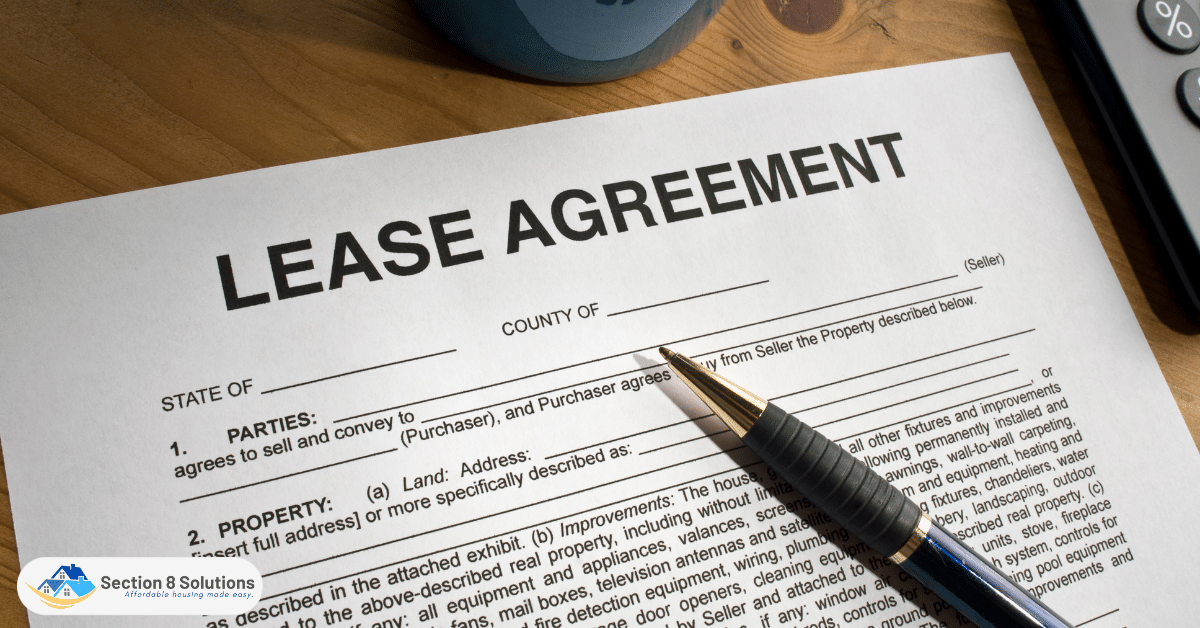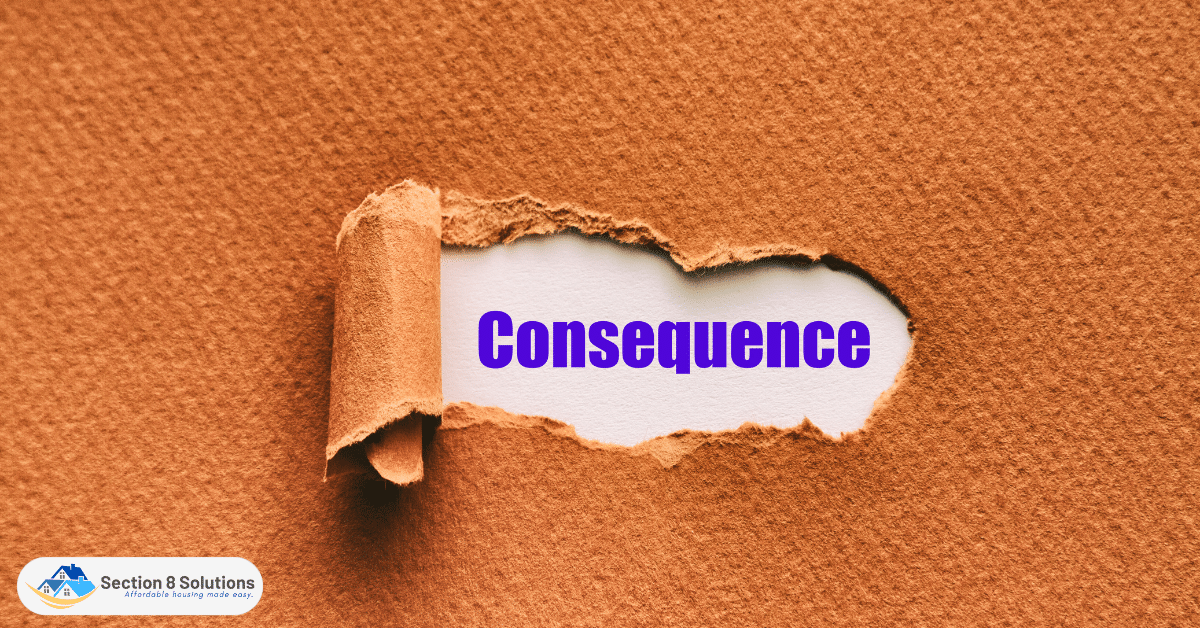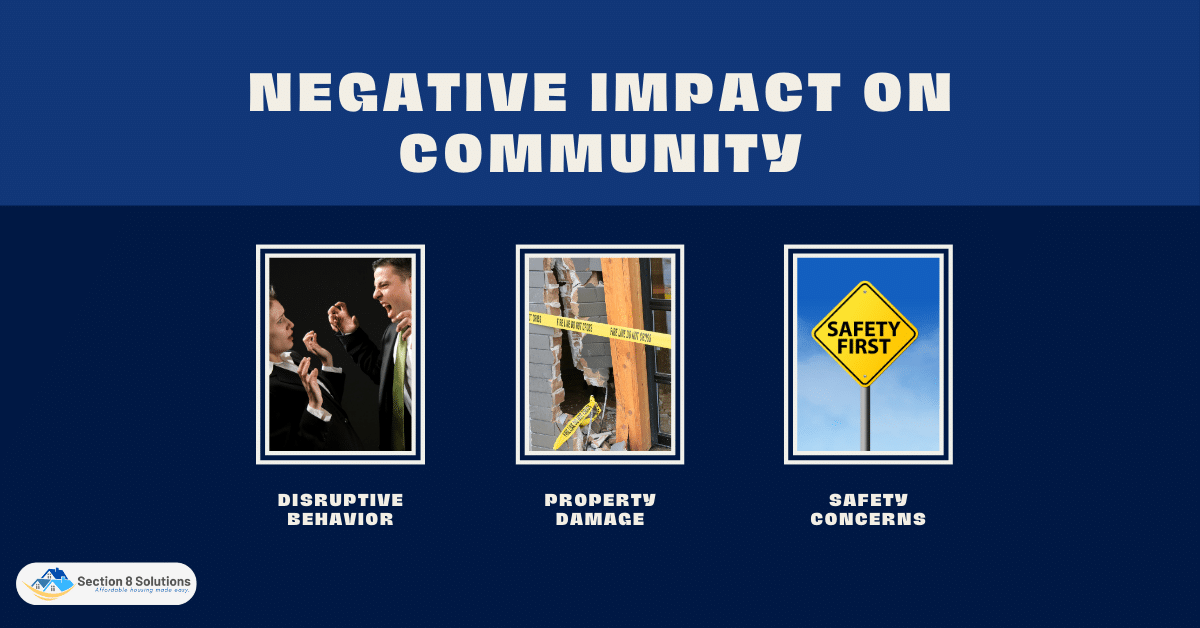If a Section 8 tenant breaks the lease, the landlord may terminate the tenancy and begin the eviction process. The tenant may lose their housing voucher and be required to pay back any overpaid rent. The severity of the consequences will depend on the specific circumstances of the lease violation.
In this blog post, we’ll explore what happens if a Section 8 tenant breaks the lease, including the potential termination of tenancy, loss of housing voucher, and repayment of overpaid rent.

Termination of Tenancy
As a landlord of a Section 8 property, there may come a time when you need to terminate a lease agreement. Understanding the proper procedures for terminating a Section 8 lease can help ensure a smooth process for both you and your tenant.

1. Non-Renewal of Lease
Landlords can end Section 8 leases by not renewing. This option is usually used when the landlord doesn’t want to renew the lease. Landlords must notify tenants before lease termination.
State and lease terms determine the notice period for non-renewal of a Section 8 lease. Landlords must give 30 days’ notice before lease expiration. This written notice should state that the lease will not be renewed.
2. Mutual Agreement
When it comes to ending a Section 8 lease arrangement, landlords and renters also have the option of coming to an agreement among themselves. When both parties are in agreement that the lease should be canceled early, this choice presents the best possible outcome. It is essential that all parties sign a written agreement describing the terms of the termination. This will ensure that there are no misunderstandings or disagreements in the future over the terms of the termination.

3. Termination for Cause
Section 8 landlords can also terminate for cause. When a tenant breaks the contract by not paying rent or committing a crime, this option is used. Landlords must follow eviction processes and notify tenants of violations in such circumstances.
State and municipal regulations and the lease agreement govern termination for cause. Landlords must notify tenants of violations in writing and give them time to fix them. If the problem persists, the landlord can evict.
4. Lease Violation
Section 8 landlords often terminate leases for lease violations. If a tenant breaks the lease, the landlord can terminate it. Lease infractions include illegal activity, property damage, and disruptive behavior that disturbs other renters.
It’s important for landlords to follow proper eviction procedures when terminating a lease agreement for a lease violation. This typically involves providing the tenant with written notice of the violation and allowing them a certain amount of time to correct the issue. If the issue is not corrected, the landlord can then proceed with the eviction process.

5. Sale of Property
If a landlord sells the property, they may be able to terminate the lease agreement. However, tenants must still be given proper notice of the termination and may be entitled to relocation assistance.
Landlords can safeguard their interests and comply with federal and state laws by terminating Section 8 leases properly. Termination should be the last choice, and landlords should try to resolve tenant difficulties before terminating.

Loss of Housing Voucher
Section 8 tenants can lose their housing voucher if they fail to comply with the program’s requirements and guidelines. There are several reasons why a tenant may lose their voucher, including but not limited to, failing to report changes in income or household composition, violating the lease agreement, or engaging in criminal activity.
When a Section 8 tenant is at risk of losing their voucher, they will typically receive a notice from their local Public Housing Agency (PHA) outlining the specific reasons for the potential termination of their voucher. The notice will also provide information on the appeals process and any steps the tenant can take to remedy the situation.
If the PHA determines that the tenant is no longer eligible for the program, they may terminate the tenant’s voucher and require them to vacate the property. Depending on the specific circumstances, the tenant may also be required to repay any overpaid rent and/or forfeit their security deposit.

Repayment of Overpaid Rent
Section 8 tenants who break their leases may have to pay back any overpaid rent to their landlord or PHA. When a tenant receives more rental assistance than their income and leasing agreement allow, they have overpaid rent.
Coordinating with the landlord and PHA to calculate overpaid rent might be difficult. The tenant’s income and other factors will decide the PHA’s rental assistance. The PHA will investigate overpaid rent if the landlord reports a lease violation to them.
The PHA may demand the renter reimburse unpaid rent. Repayment may be made directly to the PHA or subtracted from future rental assistance payments, depending on the case.

Severity of Consequences
Tenants who break Section 8 leases face harsh consequences. The tenant’s program history and the violation’s severity will determine the sanctions. Tenants may be warned or fined for minor offenses like failing to submit income or household composition changes. However, criminal behavior or property damage may result in eviction or housing voucher loss.
Breaking a Section 8 lease has varying implications. Violation kind is important. Violations that endanger renters or the community may be more severe. The tenant’s program history may also matter. Tenants with a history of lease violations or warnings may face harsher fines for future offenses.
The tenant’s participation in fixing the problem can also affect the consequences. Tenants who act quickly and engage with their landlord or the Public Housing Agency may escape harsher sanctions. Finally, the tenant’s repercussions may depend on the landlord or Public Housing Agency’s cooperation. Landlords or organizations may assist tenants to resolve difficulties without imposing harsher sanctions.

Negative Impact on Community
When Section 8 tenants violate their lease agreements, it doesn’t just affect themselves and their landlords – it can also have wider impacts on the community. In this section, we’ll explore some of the negative consequences of lease violations for the community as a whole.

- Disruptive behavior: Tenants who engage in disruptive behavior, such as loud parties or frequent disturbances, can cause tensions with their neighbors and disrupt the peace and quiet of the community. This can create an uncomfortable living environment for other tenants and negatively impact the overall quality of life in the community.
- Property damage: Tenants who cause damage to the property, either intentionally or unintentionally, can lower property values and decrease the overall attractiveness of the community. This can also make it more difficult for the landlord to attract future tenants, as they may be hesitant to rent in a community where property damage is common.
- Safety concerns: If a Section 8 tenant engages in illegal activities, such as drug use or violence, it can create safety concerns for other tenants and the community at large. This can result in increased police presence, which can further contribute to tensions and discomfort in the community.
Overall, tenants who violate lease agreements can have a negative impact on their community, making it less attractive to future tenants and potentially lowering property values. It’s important for Section 8 tenants to be mindful of their behavior and to be respectful of their neighbors and the community in which they live.
Conclusion
Finally, breaching a Section 8 lease agreement can harm landlords and tenants. Eviction, loss of housing vouchers, trouble obtaining housing, and community harm have been mentioned. Section 8’s success and everyone’s well-being depend on lease compliance.
There are several resources for Section 8 landlords and tenants. HUD provides information on lease agreements, evictions, and more for renters and landlords. Housing authorities and tenant advocacy groups may also help. We can keep Section 8 safe and cheap by being informed and working together.












